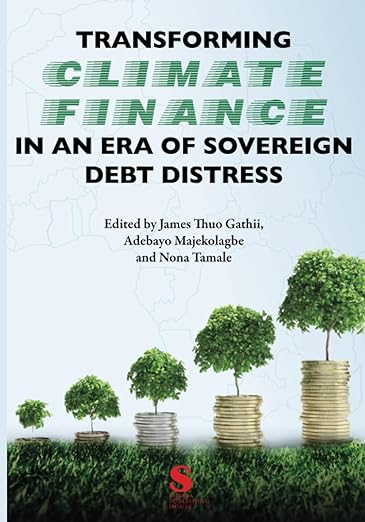Prof. Adebayo Majekolagbe’s book launches at Africa Climate Summit
Benjamin Lof - 10 October 2023

A new book by Assistant Teaching Professor Adebayo Majekolagbe of the University of Alberta Faculty of Law launched recently at the Africa Climate Summit and features a chapter by Assistant Professor Godwin Dzah.
Transforming Climate Finance in an Era of Sovereign Debt Distress (Sheria Publishing House) is co-edited by Majekolagbe alongside Professor James Thuo Gathii of Loyola University Chicago and Nona Tamale of Makerere University in Uganda.
The timely collection of essays, written by researchers under the umbrella of the African Sovereign Debt Justice Network, identifies the prevalence of debt-driven climate finance solutions as the latest sign that the global finance and sovereign debt architecture does not work.
Climate finance, according to the United Nations, is financing that seeks to support mitigation and adaptation actions that will address climate change, with the assistance going “from Parties with more financial resources to those that are less endowed and more vulnerable.”
Majekolagbe and his co-authors argue that, despite various attempts over many decades, climate finance is falling well short of what is needed, and this failure is partly due to its underwriting by the global finance industry (banks and private corporations), whose involvement is mostly driven by the commodification and profitization of climate change ‘solutions.’
They posit that these over-hyped and ineffective solutions are pushing African countries and many others across the Global South further into unsustainable debt.
The book calls for a shift away from climate finance driven by profit and shows the need for initiatives that “center the wellbeing of people, communities, and ecosystems…accompanied by adequate financing that is not accompanied by further indebtedness.”
Each chapter offers proposals for “how to truly transform climate finance so that it can enable a green transition and address questions such as loss and damage without entrenching the already broken global financial and debt architecture.”
Prof. Godwin Dzah
Dzah’s contribution, “Africa and the (New) Green Finance Rush,” provides an urgent critique of the intersection of climate finance, debt and bonds.
Dzah examines green finance instruments (including green loans, credits or bonds, and sustainability bonds) and warns that “the ecological crisis can become a window of opportunity to reinject and embed capitalist and neoliberal paradigms into global governance.”
Green finance instruments are “ostensibly designed to fund activities that are considered environmentally-friendly or advance climate and sustainability-related projects.”
In one of many areas he covers, Dzah notes that the recent rush to extract critical minerals and other natural resources needed to supply technocentric green initiatives (such as the production of lithium-ion batteries and microchips) shows that despite positive branding, the result continues to be the exploitation and irreparable damaging of African ecological systems for profit.
He argues that countries like the United States and China “are willing to commit funds to Africa under the guise of green finance… to ensure unfettered access to Africa’s natural resources.”
Dzah’s chapter illuminates how the prevailing green narrative hasn’t reflected the reality on the ground so far, and hasn’t translated “into a positive outcome for communities and the environment in Africa.”
He proposes that African countries develop a legal framework which would ensure local economies benefit while “monitoring the implications of green finance for resource exploration and consequential socio-ecological impacts.”
As Dzah states, “Africa must assert itself in this debate.”
With this book, he and Majekolagbe are aiming for that debate to be heard loud and clear.